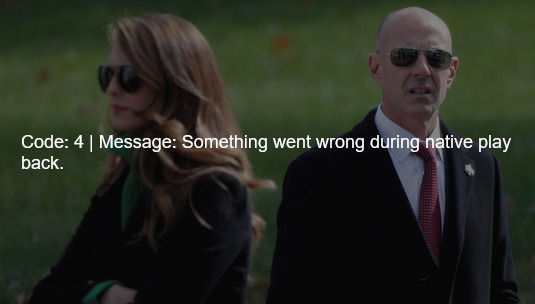
“Code: 4 | Message: Something went wrong during native playback.”
–
The letter, which was originally sent to the House and Senate Homeland Security Committees by the Department of Homeland Security Inspector General, says the messages were erased from the system as part of a “device-replacement program” after the watchdog asked the agency for records related to its electronic communications.
“First, the Department notified us that many US Secret Service text messages from January 5 and 6, 2021, were erased as part of a device-replacement program. The USSS erased those text messages after OIG requested records of electronic communications from the USSS, as part of our evaluation of events at the Capitol on January 6,” the letter from DHS IG Joseph Cuffari stated.
“Second, DHS personnel have repeatedly told OIG inspectors that they were not permitted to provide records directly to OIG and that such records had to first undergo review by DHS attorneys,” Cuffari added. “This review led to weeks-long delays in OIG obtaining records and created confusion over whether all records had been produced.”
The Intercept was first to report the DHS IG letter.
The Homeland Security inspector general did not immediately respond to CNN’s request for comment.
The US Secret Service pushed back on the allegations in a statement, saying that “the insinuation that the Secret Service maliciously deleted text messages following a request is false. In fact, the Secret Service has been fully cooperating with the OIG in every respect – whether it be interviews, documents, emails, or texts.”
The statement continued later: “DHS OIG requested electronic communications for the first time on Feb. 26, 2021, after the migration was well under way. The Secret Service notified DHS OIG of the loss of certain phones’ data, but confirmed to OIG that none of the texts it was seeking had been lost in the migration.”
Sen. Gary Peters, chairman of the Senate Homeland Security and Governmental Affairs Committee, called the allegations “concerning” in a statement Thursday. “We need to get to the bottom of whether the Secret Service destroyed federal records or the Department of Homeland Security obstructed oversight. The DHS Inspector General needs these records to do its independent oversight and the public deserves to have a full picture of what occurred on January 6th,” the Michigan Democrat said.
Rep. Bennie Thompson, a Democrat from Mississippi, chairs both the House Homeland Security and January 6 committees. He acknowledged in a statement Thursday evening that the panel had gotten the letter.
“The Committee on Homeland Security received a letter from the DHS Inspector General regarding the Secret Service deleting text messages the Office of Inspector General requested as part of its investigation into the January 6th attack on the Capitol,” Thompson said. “The Committee will be briefed about this extraordinarily troubling destruction of records and respond accordingly.”
While the letter does not say whether the DHS watchdog believes these text messages were erased intentionally or for a nefarious reason, the incident adds to growing questions about the Secret Service’s response to the US Capitol attack.
The Secret Service has been in the spotlight since witnesses have described how former President Donald Trump angrily demanded that his detail take him to the Capitol following his speech at the White House Ellipse – shortly before rioters breached the building.
A former adviser to then-Vice President Mike Pence also referenced the Secret Service in his testimony. Greg Jacob, Pence’s former counsel, told the panel that Pence refused to get into the vice presidential vehicle after being evacuated from the Capitol, raising concerns that the driver would have taken him to a secure location and thus prevent him from certifying the electoral results.
More than a year after the riot, the Homeland Security inspector general review of the Secret Service and its actions on January 6 remains ongoing.
This story has been updated with additional developments Thursday.
CNN’s Whitney Wild and Hannah Rabinowitz contributed to this report.
—












